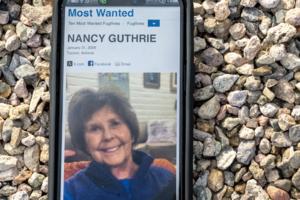Entertainment
/ArcaMax

Britney Spears arrested on suspicion of DUI. 'Completely inexcusable' incident, rep says
LOS ANGELES — Britney Spears was arrested Wednesday night in Ventura on suspicion of DUI, according to online records from the Ventura County Sheriff’s Office, with the singer’s representative calling the incident “inexcusable.”
Spears, 44, was arrested by the California Highway Patrol around 9:30 p.m. Wednesday and booked around 3 a....Read more

These 3 Disney movie songs, animated with sign language, are headed to Disney+
LOS ANGELES — New animated sequences of songs from "Encanto," "Frozen 2" and "Moana 2" are headed to Disney+.
Disney Animation announced Wednesday that "Songs in Sign Language," comprised of three musical numbers from recent Disney movies newly reimagined in American Sign Language, will debut April 27 in honor of National Deaf History Month. ...Read more

Todd Meadows' mom doesn't want 'Deadliest Catch' to air his death
The mother of “Deadliest Catch” fisherman Todd Meadows does not want his death to be featured on the Discovery channel show.
“We don’t want to see any footage from the accident and do not want Discovery to air any of that footage or make money off of our son’s death,” Angela Meadows told TMZ. “We hope they only air good things of ...Read more

Britney Spears, 'celebrity,' arrested on suspicion of DUI in Ventura County
LOS ANGELES — Britney Spears was arrested Wednesday night in Ventura on suspicion of DUI, according to online records from the Ventura County Sheriff’s Office.
Spears, 44, was arrested by the California Highway Patrol around 9:30 Wednesday night and booked around 3 a.m. Thursday. Her car was impounded, and she was released just after 6 a.m....Read more

Review: Decadent and disorderly, 'The Bride!' is a spectacular beast rampaging out of control
"The Bride!" is a maniacal assemblage of '30s musicals, '40s noirs, 19th century literature and 21st century ideology. Every wacky second, you're well aware how perilously close it is to falling apart at the seams. This spiritual sequel to "Frankenstein" is a romantic tale of obsession, possession and fantasy — adjectives that also apply to ...Read more

Savannah Guthrie's return to 'Today' confirmed as she visits studio
NEW YORK — Savannah Guthrie was spotted in the “Today” show studio for the first time since her mother, Nancy, disappeared.
While she did not appear on air, Jenna Bush Hager confirmed that Guthrie had come “home” to pay them all visit. She added that Guthrie “talked to all of us” and “hugged every single person” she could.
�...Read more

Patrick Adams confirms sex of third baby
Patrick J. Adams has confirmed his and Troian Bellisario's third child is a girl.
The 44-year-old actor - who is best known for starring alongside Meghan, Duchess of Sussex, in Suits - and his spouse revealed in January they had welcomed a new baby into the world, and now Patrick has confirmed he has a "lot of women" in his life, including all ...Read more

Savannah Guthrie visits Today show set
Savannah Guthrie has returned to the set of the Today show while the search for her missing mother continues.
The 54-year-old presenter has been absent from the show since 30 Januaru, two days before her family reported 84-year-old Nancy Guthrie missing from her home in Arizona, but on Thursday (05.03.26), she stopped by Studio 1A at the ...Read more

Fears mount at CBS News and CNN over merger, consolidation
Paramount's $111 billion deal to acquire Warner Bros. Discovery will put two of the most storied journalism brands — CNN and CBS News — under one roof.
The combination has been proposed before with the aim of consolidating news-gathering costs. Those plans fell apart largely over who would be in control.
But if the Paramount-WBD ...Read more

Courtney Love teases a Hole reunion tour
Courtney Love and Melissa Auf der Maur are hinting that their grunge band Hole is going to reunite.
Auf der Maur posted several short clips featuring Hole songs playing while she strikes a series of poses.
Love posted those videos to her Instagram account and wrote: “So do we tell the kids about the tour?”
Auf der Maur responded: “It ...Read more

Andrew Gunn, producer of Disney's 'Freaky Friday' and 'Cruella,' dies at 56
LOS ANGELES — Andrew Gunn, a film producer on live-action Disney favorites including "Freaky Friday" and "Sky High," has died. He was 56.
Gunn died Monday at his Toronto home following a battle with amyotrophic lateral sclerosis, or ALS, according to an obituary.
"He was a courageous and modest man always doing for others before himself. His...Read more

Annabel Schofield, 1980s model who guest-starred on 'Dallas,' dies of cancer at 62
LOS ANGELES — Annabel Schofield, a model who was a fixture in 1980s L.A. nightlife and landed a guest-starring role in the 11th season of the CBS series “Dallas,” has died after a battle with cancer that spread to her brain. She was 62.
Schofield died Saturday in Los Angeles, according to the Hollywood Reporter, which confirmed the news ...Read more

Travis Kelce shares what he will miss most in retirement
Travis Kelce will miss being "in the heat of the battle" when he retires from the NFL.
The 36-year-old tight end - who is engaged to Taylor Swift - will see his two-year contract with the Kansas City Chiefs end later this month and while he hasn't yet made an announcement about his sporting future, he's already thinking about what he'll miss ...Read more

Brooklyn Beckham 'is disheartened' by his dad David and mother Victoria's public happy birthday posts
Brooklyn Beckham is reportedly "disheartened" by his parents' public birthday messages.
The 27-year-old star celebrated his birthday on Wednesday (04.03.26), and his famous parents Sir David and Lady Victoria Beckham shared loving messages to mark the occasion, just weeks after he blasted them in a public statement.
A source told Entertainment...Read more

Valerie Bertinelli shares Eddie Van Halen regret
Valerie Bertinelli regrets not being a better friend to the late Eddie Van Halen after their divorce.
The former One Day at a Time star was married to the rocker - who died in October 2020 after suffering a stroke while battling cancer - from 1981 until 2007 and looking back on their relationship now, she wishes she had shown more compassion as...Read more

Britney Spears arrested
Britney Spears has been arrested for allegedly driving under the influence (DUI).
The Gimme More singer was picked up by the California Highway Patrol in Ventura County at around 9.30pm on Wednesday (04.03.26) night and booked at 3am on Thursday (05.03.26).
However, Ventura County Sheriff's inmate records - which listed Britney's occupation as...Read more

Harry Styles promises 'better live show' as he cuts back travel on Together, Together stadium run
Harry Styles says hosting residencies and travelling less will allow him to deliver a stronger show while taking better care of himself and the people he works with.
The Aperture singer has explained why he's moving away from a standard world tour for his 2026 Together, Together stadium run and choosing long‑run residencies instead.
The pop ...Read more

Sharon Osbourne confirms Ozzfest's 2027 comeback with UK and US dates planned
Sharon Osbourne has doubled down on plans for Ozzfest's long‑awaited return, revealing the revived festival will ideally launch as a two‑day event at Aston Villa's Villa Park before heading to North America -- with hopes to expand even further if fans want it.
The metal festival last appeared as a standalone event in 2018, followed by a one...Read more

Selena Gomez details special birthday gift from Taylor Swift
Selena Gomez received "the sweetest" handmade gift from her friend Taylor Swift for her 30th birthday.
The Only Murders in the Building actress' husband Benny Blanco was left stunned when his wife pulled a piece of art out of storage and revealed it had been produced by the Fate of Ophelia singer - who she met when they were dating Nick and Joe...Read more

Maggie Gyllenhaal hid secret note for Jake in Stephen Colbert's sofa
Maggie Gyllenhaal left a sweet note for brother Jake in Stephen Colbert's couch.
The 48-year-old director - who cast her famous sibling for the first time in her new movie The Bride! - appeared on The Late Show the night before Jake did this week, and she snuck a note for him down the arm of the sofa at the Ed Sullivan Theater.
Host Colbert ...Read more










